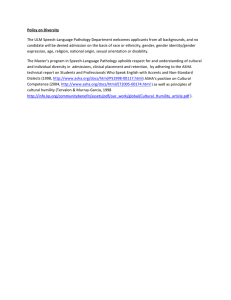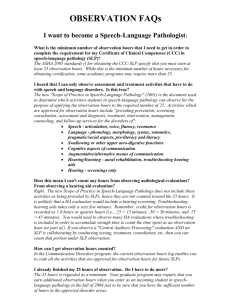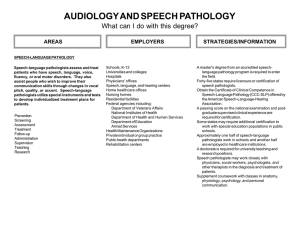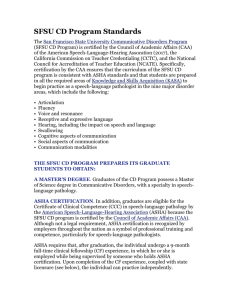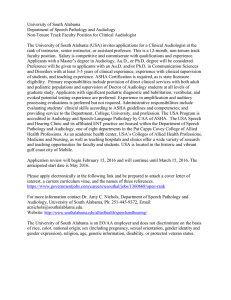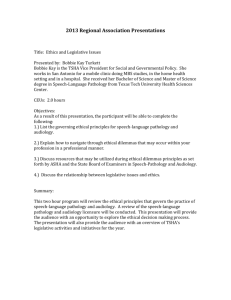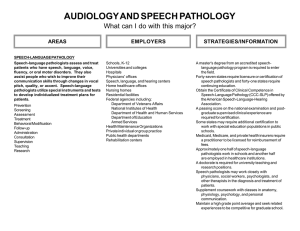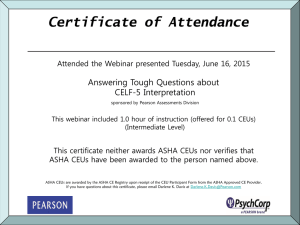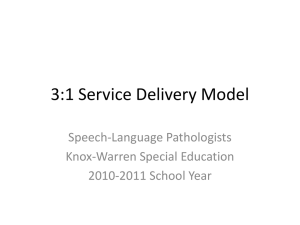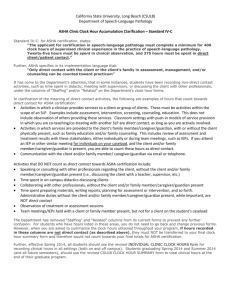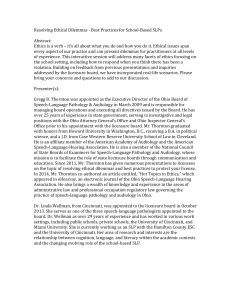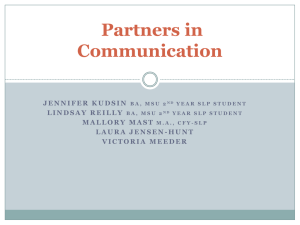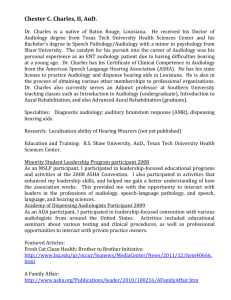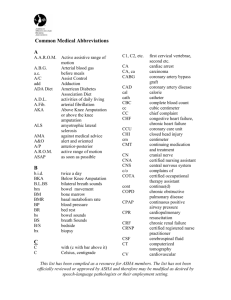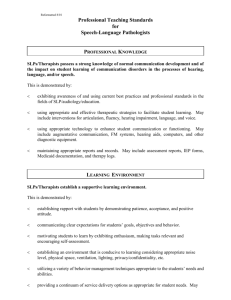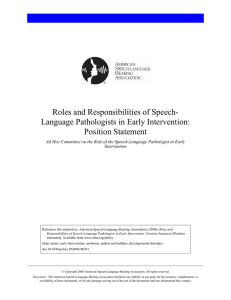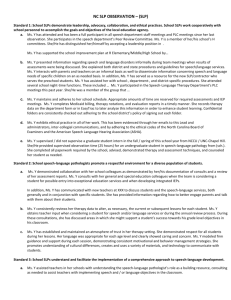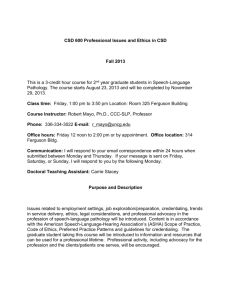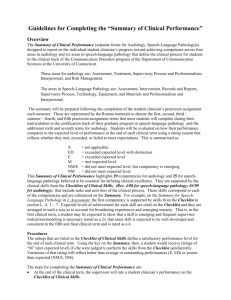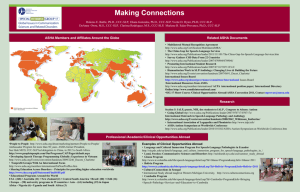The Changes in Healthcare and the Impact on Audiologists and
advertisement
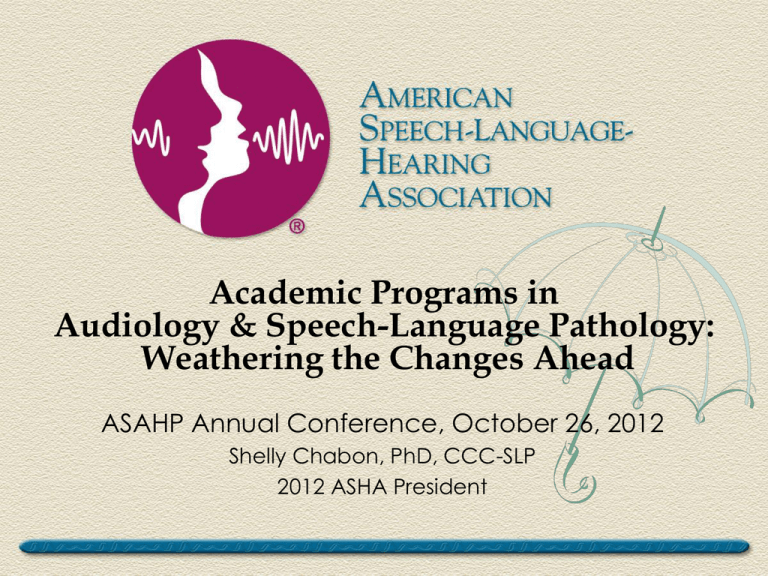
Academic Programs in Audiology & Speech-Language Pathology: Weathering the Changes Ahead ASAHP Annual Conference, October 26, 2012 Shelly Chabon, PhD, CCC-SLP 2012 ASHA President ASHA Mission & Vision Vision Making effective communication a human right, accessible and achievable by all. Mission Empowering and supporting speech-language pathologists, audiologists and speech, language, and hearing scientists. ASHA Constituency Where Members Work ASHA Constituency by Primary Employment Facility Hospital 13% Residential Healthcare 9% Non Residential Healthcare 18% Source: Year-End Counts (rounded), ASHA Membership and Affiliation, 2010 College/ University 4% Schools 50% Other 6% Winds of CHANGE “The trouble with weather forecasting is that it’s right too often for us to ignore it & wrong too often for us to rely on it.” --Patrick Young Gusts Ahead for Audiology • Growing need for hearing services (aging population) • Changing marketplace: Online hearing aid sales Perceived lack of affordable services Pressure to “unbundle” services Presence of insurance companies • Increasing dependence on technology & internet • Changing educational standards Move from AuD to PhD models Creation of specialty tracks Implementation of 4th year experiences Gusts Ahead for Speech-Language Pathology • Personnel shortages • Rising costs of health care • Fee-for-service system under fire • Outcome-driven reimbursement • Increasing caseloads • Graduate programs at capacity • Educational changes Value of clinical doctorate Supervision training & credentials Specialty certifications Forecast & Outlook for the Preparation of Future Audiologists & SLPs • Move to team-based care • Focus on interprofessional • Change in research priorities • Need for more international • • • • • collaboration Need to present a solid identity Introduction of new teaching technologies Need to assess cost of/ access to health care In God We Trust – everyone else bring data • • • experiences Increase in diversity of those served Use of online simulation MOCs Credit for experience STORMS on the Horizon “The coldest winter I ever spent was a summer in San Francisco.” --Mark Twain Showers Likely for Health Care & Education Health Care Settings Higher Education Settings Customer Satisfaction Patient Experience Student Experience Cost Reduce service Tuition costs; other volume; lower delivery costs cost Quality Outcomes Health Function; Quality of Life Graduation/ Placement Reduce Length of Stay Cut hospital days, no. of visits, etc. Reduce time to graduation Safety Student welfare/ Conflict resolution/ Violence reduction on campuses Patient welfare/ Reduce errors/ Reduce unnecessary complications Adapted from Johnson, A. (2012) What is the (Preferred) Educational Future in SLP for Health Care Practice? ASHA Changing Healthcare Landscape Summit [presentation] Occasional Turbulence Ahead for the Professions Decreased funding to colleges & universities Increased school debt + decreased salary rates Students question value of advanced degrees Fewer scientists Fewer able to practice with under-served populations Increased demands from stakeholders Pressure to increase enrollment Pressure to generate more clinical revenue Pressure to place bachelor’s level students who don’t get into grad school Wind Advisory Increased need to • Expand the pipeline for • • • • clinicians entering the professions to meet burgeoning needs of schools and clinics Build outreach and provide opportunities for more diverse students Explore the benefits of interprofessional education, credit for prior-learning experiences & innovative clinical education Identify funds for more scholarships Reassess the continuum of education • Adjust curricula to teach skills in • • team-based care Assess value of undergraduate major as well as clinical doctorate Communicate value of graduate degree DRESSING for the weather “There is no such thing as bad weather, just unsuitable clothing.” --Alfred Wainwright Clear Skies Ahead for Audiologists Much faster than average growth through 2018 Additional 3,200 audiologists needed 25% increase in job openings Source: bls.gov Clear Skies Ahead for SLPs Faster than average growth through 2018 Additional 22,100 SLPs needed 19% increase in job openings Source: bls.gov Warming Trends • Abundance of qualified students • High success rates of graduates • Personnel shortages translate into high employment availability for graduates • Established models continue to produce successful clinicians Adapted from Hale, S. (2010) Storm Front Approaching: The Consequences of Doing Nothing. CAPCSD Plenary Session [presentation] Dressing for the Weather: Audiology • Prioritize patient centered care Incentivize measure/value of outcomes Incorporate patient’s goals into treatment • Adjust curricula to reflect healthcare changes New reimbursement models Biotechnology Use of large data sets to evaluate outcomes & demonstrate value Preferred practice patterns Online/blended learning Interprofessional education Dressing for the Weather: Speech-Language Pathology • Expand clinical paradigm Adopt ICF framework Focus on context-based communication effectiveness (vs. on deficit & impairment) • Position SLPs as leaders in communication health • Develop/enhance quality & outcomes measures • Reframe/rebrand the profession • Widely disseminate information Verbal Warming: Questions now being asked • Do students understand the ICF framework and will they be prepared to use it to evidence the value and outcomes of their services? • Do students understand that their ability to be reimbursed will be based on outcomes and not treatments? • Will students be prepared to compete? • Is the standard university clinic the right place to learn the best practice? Verbal Warming: Questions now being asked • How should we be responding [to rising health costs & lack of coverage] as a profession? • How will we evidence to regulators, health care rating organizations, accrediting bodies, employers, commercial payers and the public the necessity, quality, efficiency & accountability of our services? • How can we energize individuals to become catalysts of change? • What does the ideal clinician of the future look like?
